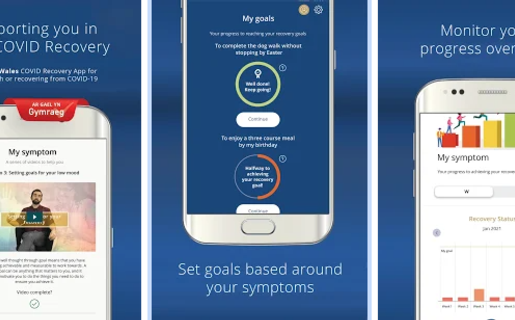COVID Rehabilitation

As you find yourself recovering from COVID-19 you may still be coming to terms with the impact the virus has had on both your body and mind. These changes should get better over time, some may take longer than others, but there are things you can do to help.
There are plenty of resources and lots of information available to people suffering with COVID-19, as well as Long-COVID syndrome including the Keeping Me Well website, and COVID Recovery App.
NEW COVID Recovery app launched in Wales to help support people with long-COVID
A COVID recovery app has been launched today (20 January) as part of wider support on offer for people experiencing the longer term effects of coronavirus.
The bilingual, first of its kind, app has been developed by the NHS Wales respiratory health group on behalf of the Welsh Government and has been designed to offer people a bespoke tool and personal coach to help them on their road to recovery.
With more than 100 videos and links to advice, app users will be able to record their symptoms, track their progress and learn to manage their condition at home with support. It includes advice from therapists, psychologists, dietitians and consultants.
The app is part of a wider national approach to support people with post-COVID syndrome which includes supporting health professionals to recognise the symptoms, signposting people to support and providing a clear pathway for people as they go through the healthcare system.
Search ‘covidrecovery’ on the Apple and GooglePlay app stores.

Physical Recovery from COVID-19
Being active in addition to good nutrition and rest is essential in helping you recover from COVID-19.
At Cardiff and Vale University Health Board we advocate taking a ‘pacing’ approach to managing your return to physical health. Pacing focuses on taking small steps towards your activity goal, starting with simple activities over short periods of time and gradually increasing the difficulty and duration of them.
If you have been diagnosed with Long-COVID, or think you may have Long-COVID, it is important to seek advice from a health professional before starting any graded exercise therapy programme as you may need supervised or guided therapy to help with your rehabilitation.
Recovery for most people means finding your current level, practicing until you feel comfortable, and then making small changes. Everybody’s starting point is different and the size of the changes that people can manage will differ between individuals for many reasons, including previous level of activity or any pre-existing health problems.
It is important to complete activities at the right level. If you overexert yourself you risk suffering setbacks such as injury or fatigue. If in doubt, start low and build slowly.
Mental Recovery from COVID-19
Feeling stressed or anxious is normal during your recovery from COVID-19, while you are shielding, or if you are coping with a medical issue or disability during this uncertain time. Stress and anxiety can have an effect on how you physically feel and make you feel more fatigued or tired.
It is important to recognise when you are feeling stressed or anxious so that you are able to take positive steps to manage your feelings. The following websites offer advice and support with managing these feelings:
- Coronavirus and mental health tips | Mental Health Foundation
- Coronavirus Information - Together: A leading UK mental health charity (together-uk.org)
- Get.gg - Getselfhelp.co.uk
If you are feeling anxious, overwhelmed, or struggling to cope please contact your GP who may refer you to the relevant healthcare professional.
Coping with COVID-19
COVID-19 has had an impact on us all. The pandemic has been a period of significant uncertainty for everyone and we have all had to adapt our lives.
Whether you are recovering from COVID-19, shielding, coping with a medical issue or disability, or if you have faced other changes to your everyday life, it is normal if you are experiencing issues with your mental health. Stress and anxiety can have an effect on how you physically feel and make you feel more fatigued or tired.
It is important to recognise when you are feeling stressed or anxious so that you are able to take positive steps to manage your feelings. If you or someone you know require emergency assistance, please dial 999.
Find out more about urgent help that is available when it is not an emergency, or read more general information about living well at home. There are also various resources that you may find helpful in coping with COVID-19, some of which you can view on the following websites:
- The Stepiau website has information on mental health services in Cardiff and the Vale of Glamorgan, with resources specific to COVID-19.
- The NHS ‘One You’ website has a range of practical advice for managing your own mental wellbeing during the COVID-19 pandemic.
- Public Health Wales’ ‘How are you feeling’ webpages give advice on how you can access support, with specific information for parents and carers, older people, children and young people, and pregnant women.
- The Let’s Talk About CBT website has information about coping with anxiety about coronavirus, and what helps in tolerating uncertainty.
- The University of Exeter has produced Get Active Feel Good, a self-help programme that you may find helpful to get on top of your low mood, and take positive steps to improving your mental wellbeing.